From Polarization to Paradox | One Mountain Oral Essays | Dr. Marc Gafni
From Polarization to Paradox: Entering the Field of Value: Value Is Prior to Values, Meaning Is Prior to Meanings
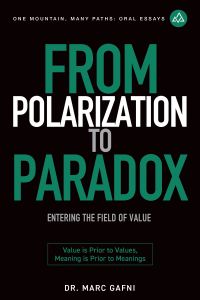
We live in a world of outrageous pain, and the only response to outrageous pain is Outrageous Love. Somehow, we know inside that this is true. The deepest pleasure of being alive is to recognize that Reality is an Outrageous Love Story.
This book is about a Planetary Awakening in Love, the emergence from Homo sapiens to Homo amor. As humans we are here to articulate and enact a new story, to participate in the evolution of love itself. With practice we can learn to place our attention on the evolutionary impulse that is alive and awake in us, as us, and through us, and calling us forth to become Evolutionary Lovers.
In this book, we are reclaiming practices of prayer, intimacy, and the sacred as part of a new politics of Evolutionary Love. This is the only way for us to move beyond separation towards a planetary coherence of synergy and wholeness.
This book explores the essential question: Who are you? The response is both simple and complex: You are an irreducibly unique expression of the Evolutionary LoveIntelligence of Reality itself, and as such you have a unique gift to give to the world, that only you can give! Each of us is an irreducibly unique expression of the LoveIntelligence and LoveBeauty of
All-That-Is, with a unique gift to give in the Unique Self Symphony. Through the lens of Evolutionary Spirituality, it becomes clear that the Universe is not a random accident. Not at all. It is an Evolutionary Love Story, moving towards ever greater intimacy and ever greater wholeness.
We are personally implicated in the great story of Reality, holding the power to transform crisis into possibility through the force of Outrageous Love. As we move into the fullness of our humanity, our personal story emerges as a chapter and verse in the Love Story of Reality itself.
Loneliness is a profound evolutionary driver, urging us to move beyond isolation into deeper connection and to say YES to the impulse of evolution within us. We are not meant to walk this path alone. The move from loneliness to loving takes us beyond the illusion of separation, and we find ourselves woven into the fabric of Unique Self Symphony.
Practice helps us to connect with the sacred at a higher level of consciousness, reclaiming devotion, evolutionary prayer, and the radical knowing that we are held by God as the Infinity of Intimacy.
Together we join genius in Unique Self Symphony—where each unique voice is radically needed, and each unique gift is desired by All-That-Is. We stand at the edge of history, as Evolutionary Lovers and co-creators of a new humanity. We learn to say Yes to the impulse of Evolutionary Love within us, to recognize that we are not separate but part of an interconnected field of intimacy, responsibility, and transformation.
Are you ready to step into this next great moment of human becoming? To say Yes to the evolutionary impulse within you? To respond to the crisis of our time with the only force great enough to meet it—Outrageous Love?
If your heart has brought you to explore this path, welcome to the Planetary Awakening in Love through Unique Self Symphonies!
Published by World Philosophy and Religion Press in conjunction with Integral Wisdom Publishers.
Book details:
Title: From Polarization to Paradox: Entering the Field of Value: Value Is Prior to Values, Meaning Is Prior to MeaningsAuthor: Dr. Marc Gafni
Series: Oral Essay Series – Volume 33
Publisher: World Philosophy and Religion Press in conjunction with Integral Wisdom Publishers.
ISBN-13: 979-8888340912
Formats: Paperback, e-book, audiobook.
Table of Contents
Chapter 1 Heroes are the Early Adopters of Homo Amor: A Forever Commitment to Cosmos
- Who We Are is Where We Place Our Attention
- The World Needs Our Holy Audacity: It’s Time for a New Story
- It’s a Wild CosmoErotic Universe, All the Way Up and All the Way Down
- “Our Success Story is More Important than the Larger Good”
- We Have a Broken System of Win/Lose Metrics Rooted in Separate Self and Materialist Assumption of Cosmos
- What Does Reality Want from Me in the Next Moment?
- We Live in a Magical Cosmos
- Heroes are Early Adopters of Homo Amor
- Every Moment is a New Invitation to the Evolution of Intimacy
- Prayer as Protest: Hallelujah
- In Relationship to God: I’m Staying Forever
Chapter 2 The Sensual Arousal of Sense-Making: Seducing Ourselves out of the Digital Trance into the Arms of Lady Justice
- We are Here to Find a New Way of Being Human
- A New Story of Value is the Minor Fluctuation Point That Jumps the System to a Higher Level of Order
- We Have to Overthrow the Old Story of What It Means to be Human
- We Have to Wake Up from the Pseudo-Ecstasies of the Digital World
- A Sensual Arousal to Sense-making
- To Seduce Yourself You Have to Have the Capacity for Sense-making
- It Never Occurs to Us That We Need to Die to Birth Ourselves
- The Hero is Willing to Die for a Higher Value
- We Need to Stand in the Integrity of Information-gathering and Sense-making
- From Salem Witch Trials to the Madness of Crowds on Twitter Threads
- The Dream of America is That You Can Feel Safe and Held in the Arms of Lady Justice
- The Destruction of the American Dream
- McCarthyism is a Violation of the Goddess
- Cultivating Discernment: We Need to Arouse Ourselves to Create a New Public Commons
- The Murder of Eros
- How Do We Discern?
- A Prayer for Justice
Chapter 3 Eros and Existential Risk — 21 Steps to Homo Amor: My Transformation is the Transformation of the Whole
- The Holy Band: A Vision of a Planetary Awakening in Unique Self Symphony
- Eros Means the Unbearable Goodness of Being and the Unbearable Need for Me, for My Life, for Who I Am
- Twenty-One Steps to Homo Amor
- Ode to Joy: An Active Meditation
- Witnessing the Exteriors
- All of a Sudden, This Square is Transformed into Shimmering Joy
- The Joy was Always There
- It All Depends on Me, and It All Depends on You
Chapter 4 Roe vs. Wade — Evolutionary Sensemaking from Polarization to Paradox: Re-entering the Field of Value
- The Breakdown of Story of Value is the Root Cause of Existential Risk
- What is Outrageous Beauty?
- The Only Response to Outrageous Pain is Outrageous Love
- Roe vs. Wade: The Second You Demonize the Other Side, We Are Out of Beauty and We Are in Outrageous Pain
- What is Happening in the Pro-life vs. Pro-choice Clash?
- Each Side Caricatures the Other’s Position to Highlight the Absurdity of the Other’s Value
- The Decontextualization of Value is Idolatry
- The Only Response to Outrageous Pain is Outrageous Love
- Both Pro-life and Pro-choice Stepped Out of the Field of Value
- If Both Sides Step into the Field of Value, They Share the Field of Value Together
- When We’ve Stepped Out of the Field of Value, There’s No Intimacy Between Values
Chapter 5 Two Evolutionary Practices of Homo Amor — Live Your Dream and Confess Your Greatness
- Celebration in the Middle of Existential Risk
- You Can’t Change the World Unless You Are Willing to Already Live in the World That’s Already Changed
- We Are Going to Change the Source Code of Culture
- Sabbath is the Technology of Living the Dream
- Laughter Matters
- Evolutionary Love Code: Confession of Greatness
- Confession of Sin Became a Tool to Subjugate People into Servitude
- The New Locus of Confession Has to Be Confession of Greatness
- Confession of Greatness is Always Unique
- 95% of the Game is the Willingness to Fail
- When All of Reality Cheers Your Moment of Greatness
Chapter 6 Baseball Principles — A Home Run into the Heart of Homo Amor
- The Meta-Crisis is a Risk to the Existence of the Future Itself — Yet We Are Filled with Hope!
- Step Forward and Play
- Evolutionary Love Code
- The Era of Pax Americana is Ending
- Baseball is a Place Holding a Mystery
- Baseball in Response to the Meta-Crisis: Why is Baseball Magic?
- New Grounding of the Common-Sense Sacred Axioms of Value
- The Story of Field of Dreams: “If You Build It, They Will Come”
- Fourteen Principles of Baseball
- The Story of the Movie The Natural
- A League of Their Own
- Praying in the Field of Value
Chapter 7 To Respond to the Meta-Crisis, We Need to Re-Vision Who We Are
- There is No Now Separate from the Past and the Future
- “Social Self” is a Degraded View of Who We Are
- Traditional View of the Self Generates Meta-Crisis
- The Notion of Social Self Generates Soft Totalitarianism
- Our Notion of Self Creates Our Society
Chapter 8 This Poignant Moment of Neuro-Cultural Plasticity — A Time Between Worlds and a Time Between Stories
- The First Practice of Chant: We Are the Music
- The Way of the Heart Includes the Mind and the Intellect
- The Way of the Heart: Reality is Eros
- We Live in a Time Between Stories
- We Have the Capacity to Create a New Superstructure Worldview to Change the Vector of History
- Value is Real, and Value Evolves
- The Potential Future is Vast — There’s So Much More Value to Come
- The Future Depends on What We Do Now
- Neuro-Cultural Plasticity
- Values Are Not Merely Pragmatic
- In Response to Nihilism, You Get Closed Societies
- The Current Trajectory is Toward the Death of Our Humanity
- Up Till Now, We Have Not Presented a Coherent System of Value in the World
- Placing Our Lives on the Altar of History
- Turning to the Divine to Partner with Us
Chapter 9 Homo Amor — The Fulfillment of Homo Sapiens is Radically Present with the Past, Present and Future
- Evolving Who We Are
- The Fourth Big Bang in the Narrative Arc of Evolution
- We Are the People We’ve Been Waiting For
- Homo Amor Consciousness is: I Am Everyone, and Everyone is Me
- Homo Amor Integrates All of the Past, Now, and All of the Future
- God Plus Humanity Equals More God
- The Civilization Will Crash Unless We Evolve the Source Code
- A New Story of Value is Possible Because There is No Value Lock-in
- We Need to Reanimate Open Societies
- We Need to Weave Together the Unique Values of All Civilizations
- This Can Be Done
- We Are Speaking It into Existence
- Is It Your Responsibility? Is It Yours to Do?
- The Fourth Big Bang Needs to Happen Through Us
- The New Name of God is the Infinite Intimate
Chapter 10 From Meta-Crisis to the Crossing — From Homo Sapiens to Homo Amor
- Evolutionary Love Code
- This Moment is Built into the Very Structure of Reality
- Homo Sapiens Has Come to the End of Her Possibility
- We Are Not Alone in Cosmos
Chapter 11 What We Need for the Attention Rebellion to Succeed
- A New Story Generates New Reality
- Evolutionary Love Code: Eros is the Placing of Attention
- The Internet is Designed to Scatter Attention
- A Brief History of Attention
- When There is Nothing to Pay Attention To
- To Be in Love is to Place Attention
- Seeing with New Eyes is the Essential Quality of Erotic Universe
- The Attention of the Infinite Differentiates Uniquely Through Me
- Reclaiming Attention
Chapter 12 “America for Americans?” vs. “There Are No Strangers and No Immigrants in the Field of Value: There is Only Family”
- You Cannot Talk About Immigration Without First Principles and First Values
- What Are the Issues at Stake for the Host Country?
- What Are the Immigrants’ Obligations to the Country?
- There Are No Strangers in the Field of Value
- The Immigration Fiasco is an Expression of the Global Intimacy Disorder
- Invitation to Participate in the Field of Value
- Four-Fold Song
- Evolutionary Love Code
- We Need to Participate in the Evolution of Love
- In the Field of Value, the Immigration Issue Softens
- Beneath Surface Values, There is Real Value
- Local vs. Global: From Contradiction to Paradox
Chapter 13 USA Elections — What Does It Mean to Partner with God in This Moment?
- Evolutionary Love Code
- A Vision for the Future is Everything
- It is a Moment of Reckoning
- Take It All Up in Your Painfully Expanded Soul
- When Society Disintegrates, We Need Art
- Outrageous Trust
- The Project of the Great Library is a Political Project
- Beauty Means Wholeness
- Anything Great is Cumulative Over Decades
- Great is Your Trust in Me, She
About the Author:
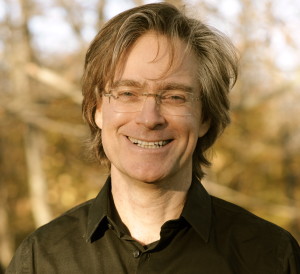 Dr. Marc Gafni is a leading public intellectual and teacher impacting the source code of global culture.
Dr. Marc Gafni is a leading public intellectual and teacher impacting the source code of global culture.
Gafni is a visionary thinker, social activist and passionate philosopher. He is known for his “source code teachings”, including Unique Self theory and the Five Selves, the Amorous Cosmos, A Politics of Evolutionary Love, A Return to Eros and Digital Intimacy.
He is author of twenty five books, of which the first ten have been published, including the award-winning Your Unique Self: The Radical Path to Personal Enlightenment.
He holds his doctorate in philosophy from Oxford University, as well as Orthodox rabbinic ordination.
He teaches on the cutting edge of philosophy in the West, helping to evolve a new ‘dharma’ or meta-theory of Integral meaning that is helping to re-shape key pivoting points in global consciousness and culture, with the aim of participating in the articulation of what Dr. Gafni together with Dr. Zak Stein and colleagues are calling CosmoErotic Humanism.
At the core of CosmoErotic Humanism is what Dr. Gafni and Dr. Stein are calling ‘First Principles and First Values’, Anthro-Ontology and a “Universal Grammar of Value”.
This is the ground of a new shared universe story and a new narrative of identity for the new human and the new humanity. This is what they are calling the emergence from Homo sapiens to Homo Amor.
This shared story rooted in First Principles and First Values can then serve as the matrix for a global ethos for a global civilization.
Gafni is considered by many to be a kind of Einstein of Philosophy who is leading a team of thinkers articulating a new vision of meaning for the world.
Dr. Gafni is the Co-Founder together with Ken Wilber and Sally Kempton of the Center for World Philosophy and Religion where he serves as its co-president. Together with Dr. Zak Stein, they are co-leading a team of thinkers, articulating a new vision of meaning for the world.
In 2014 Dr. Gafni co-initiated the Success 3.0 Summit and Rise Up movie, whose method and movement is to bring together key thought leaders and change-agents to collaboratively evolve a bold new Integral vision of Success, rooted in the entrepreneurial values of Wake Up, Grow Up, Show Up, and Outrageous Love.
Over the past 30 years, Dr. Gafni has developed evolutionary and activist programs rooted in his commitment to what he has termed “participating in the evolution of love.” Together with author and social innovator Barbara Marx Hubbard, he is working on a series of new works revolving around Evolutionary Spirituality.
Explore more:
Explore the Great Library:
Center for World Philosophy & Religion – Oral Essay Series → https://worldphilosophyandreligion.org/books/
Learn about the full Oral Essays series:
Complete Oral Essay Series → https://worldphilosophyandreligion.org/oral-essays-series-one-mountain-marc-gafni/
Dr. Marc Gafni Official Website:
https://marcgafni.com/
Center for World Philosophy and Religion:
https://worldphilosophyandreligion.org/
Free Weekly Broadcast with Dr. Marc Gafni:
https://www.onemountainmanypaths.org/
Join the community Who We Must Become:
https://who-we-must-become-3166d4.circle.so/
Free Unique Self Mini Course:
https://www.uniqueselfinstitute.com/the-unique-self-mini-course/
Formal refutations on controversy:
WhoIsMarcGafni.com
Social Media Dr. Marc Gafni:
Substack: https://substack.com/@marcgafni
Instagram: https://www.instagram.com/marcgafni/
YouTube: https://www.youtube.com/c/MarcGafni
Facebook: https://www.facebook.com/DrMarcGafni
Twitter:https://twitter.com/MarcGafni
LinkedIn: https://www.linkedin.com/in/drmarcgafni/
TikTok: https://www.tiktok.com/@drmarcgafni

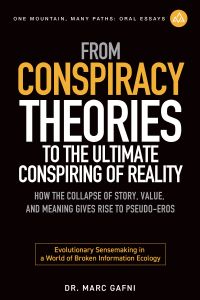

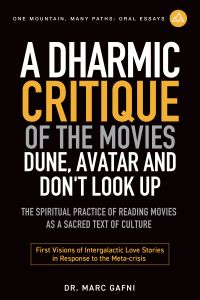
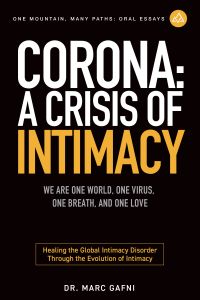
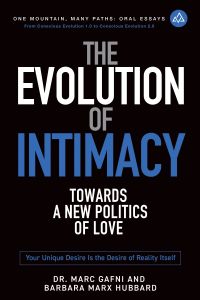
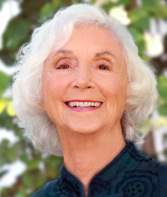 Barbara Marx Hubbard (born Barbara Marx; December 22, 1929–April 10, 2019) was an American futurist, author, and public speaker. She is credited with the Wheel of Co-Creation and together with Dr. Gafni, the Wheel of Co-Creation 2.0, as well as the concepts of the Synergy Engine and the “birthing” of humanity.
Barbara Marx Hubbard (born Barbara Marx; December 22, 1929–April 10, 2019) was an American futurist, author, and public speaker. She is credited with the Wheel of Co-Creation and together with Dr. Gafni, the Wheel of Co-Creation 2.0, as well as the concepts of the Synergy Engine and the “birthing” of humanity.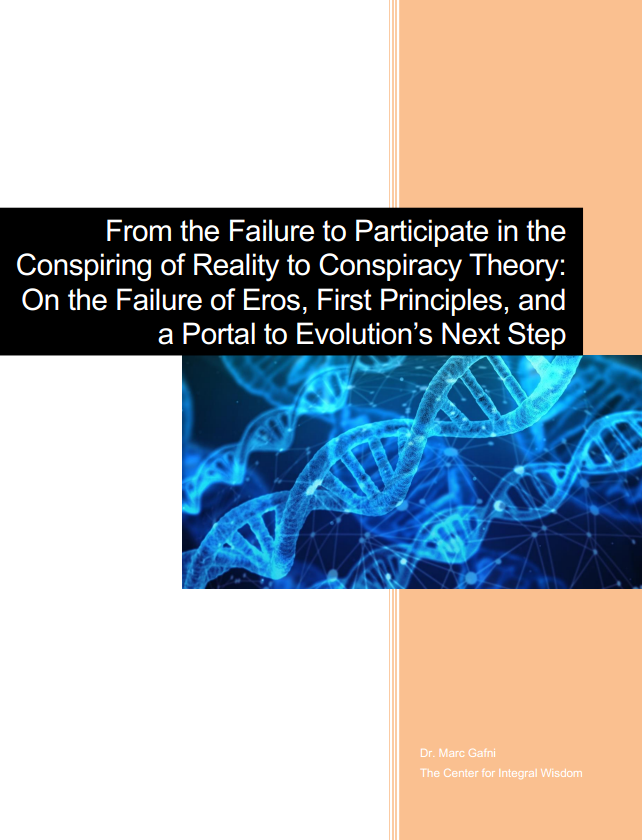
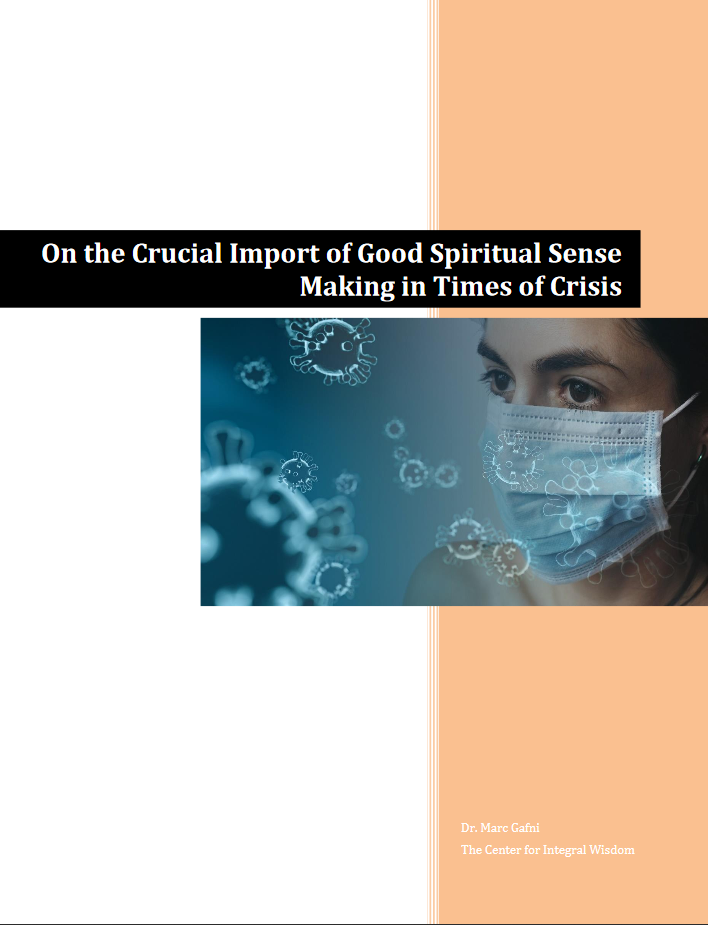
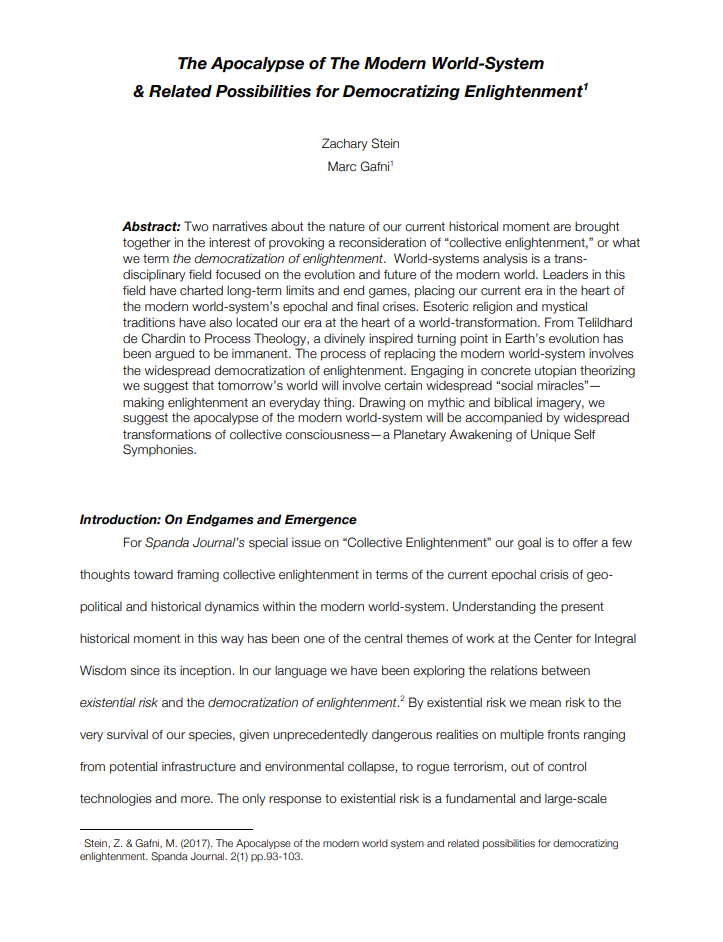


 Read this White Paper by Board Members
Read this White Paper by Board Members 